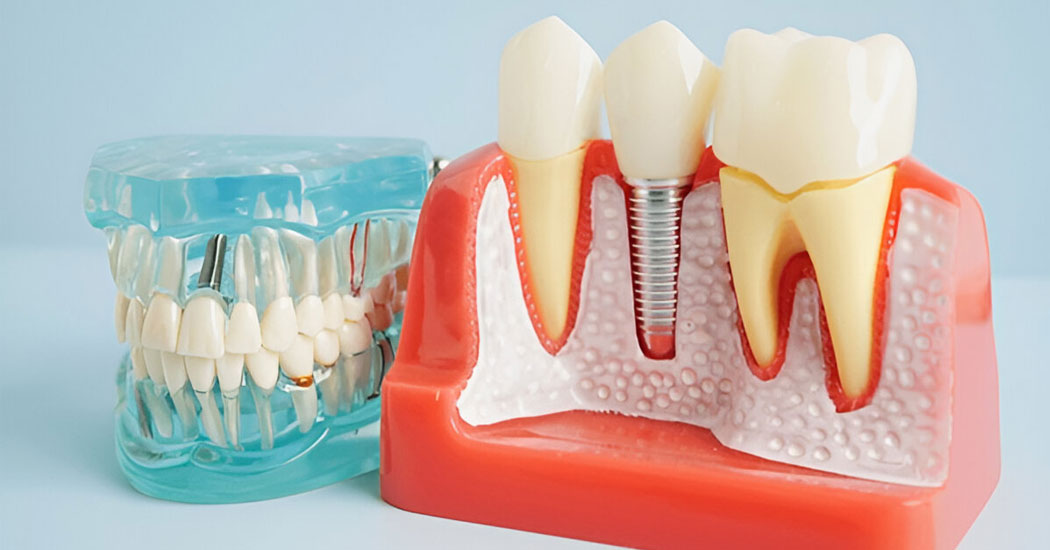Right Now
Restore Your Smile: Why Dental Implants Are the #1 Tooth Replacement Option
Missing teeth can do more than leave gaps in your smile—they can impact your confidence, ability to chew and speak, and even your oral health over time. Fortunately, modern dentistry offers a highly effective, long-lasting solution: dental implants.
Whether you've lost a tooth due to injury, decay, or aging, dental implants have become the #1 tooth replacement option for millions of patients worldwide. But what makes them superior to traditional dentures or bridges? In this blog, we’ll explore why dental implants are the gold standard in tooth restoration—and why they might be the perfect solution for you.
What Are Dental Implants?
Dental implants are artificial tooth roots, typically made of titanium, that are surgically placed into the jawbone. Once healed, a dental crown (the visible part of the tooth) is attached to the implant, creating a fully functional and natural-looking replacement tooth.
A typical dental implant has three parts:
Implant Post – The screw-like device placed into the jawbone.
Abutment – The connector that holds the crown to the implant.
Dental Crown – The custom-made, tooth-colored cap that completes the restoration.
Why Are Dental Implants So Popular?
There are several reasons dental implants have become the most recommended solution for missing teeth. Let’s break them down:
1. They Look and Feel Natural
Dental implants are designed to mimic the look, feel, and function of natural teeth. Because they are anchored directly into your jawbone, they provide unmatched stability. You can eat, speak, and smile with confidence—no shifting, clicking, or discomfort like with dentures.
2. They’re Long-Lasting
While dentures and bridges may need to be replaced every 5 to 10 years, dental implants are built to last decades, or even a lifetime, with proper care. The titanium post fuses with your jawbone in a process called osseointegration, creating a strong, permanent foundation.
3. They Prevent Bone Loss
One of the hidden consequences of tooth loss is jawbone deterioration. When a tooth is missing, the bone beneath it begins to shrink due to lack of stimulation. Dental implants are the only tooth replacement option that stimulates the jawbone, helping to preserve facial structure and prevent that sunken, aged appearance that can come with bone loss.
4. They Don’t Affect Nearby Teeth
Traditional bridges require adjacent teeth to be shaved down to support the new tooth. This can compromise the health of those teeth. Implants, on the other hand, stand alone—they don't rely on neighboring teeth for support, preserving more of your natural smile.
5. Easy Maintenance
Taking care of dental implants is simple. Unlike dentures, there’s no need for soaking or special adhesives. Just brush, floss, and visit your dentist regularly—just like you would with your natural teeth.
Who Is a Good Candidate for Dental Implants?
Most healthy adults with missing teeth are good candidates for implants. However, successful implantation requires adequate jawbone density and healthy gums. People who smoke heavily, have uncontrolled diabetes, or suffer from gum disease may need additional treatment or evaluation before receiving implants.
If your jawbone has deteriorated, don’t worry—bone grafting procedures can help rebuild the bone to support implants.
A thorough dental examination, including X-rays and 3D imaging, will determine your eligibility and help plan your customized treatment.
What to Expect During the Procedure
Getting dental implants is typically a multi-step process:
Initial Consultation
Your dentist or oral surgeon will assess your oral health and create a personalized treatment plan.Implant Placement Surgery
The titanium post is inserted into the jawbone under local anesthesia or sedation. Healing takes 3–6 months as the implant fuses with the bone.Abutment Placement
Once the implant is stable, the abutment is attached. This serves as a base for the crown.Crown Placement
A custom crown is placed on top of the abutment, completing your new tooth.
While the process may take a few months, the result is a permanent, beautiful, and functional smile.
How Much Do Dental Implants Cost?
The cost of dental implants can vary based on factors like location, number of implants needed, and whether additional procedures (like bone grafts) are required.
On average, a single dental implant cost depends on city and state, including the post, abutment, and crown. While this may seem high upfront, the long-term value and durability often make it the most cost-effective choice over time.
Many dental offices offer financing options or payment plans to help make implants more accessible.
Invest in Your Smile
Dental implants do more than replace missing teeth—they restore your confidence, your comfort, and your quality of life. Whether you're missing one tooth or several, implants offer a permanent, reliable solution that looks and feels just like the real thing.
If you’re tired of hiding your smile or struggling with loose dentures, it may be time to consider dental implants in Chandkheda Ahmedabad. At DANTBATRISA - The Family Dentist, we offer advanced dental implant solutions to help restore your smile, improve your oral health, and boost your confidence. Talk to our experienced team today to find out if you’re a candidate, and take the first step toward a healthier, more confident smile.
More Posts
Report This Post
Please complete the following requested information to flag this post and report abuse, or offensive content. Your report will be reviewed within 24 hours. We will take appropriate action as described in Findit terms of use.

















